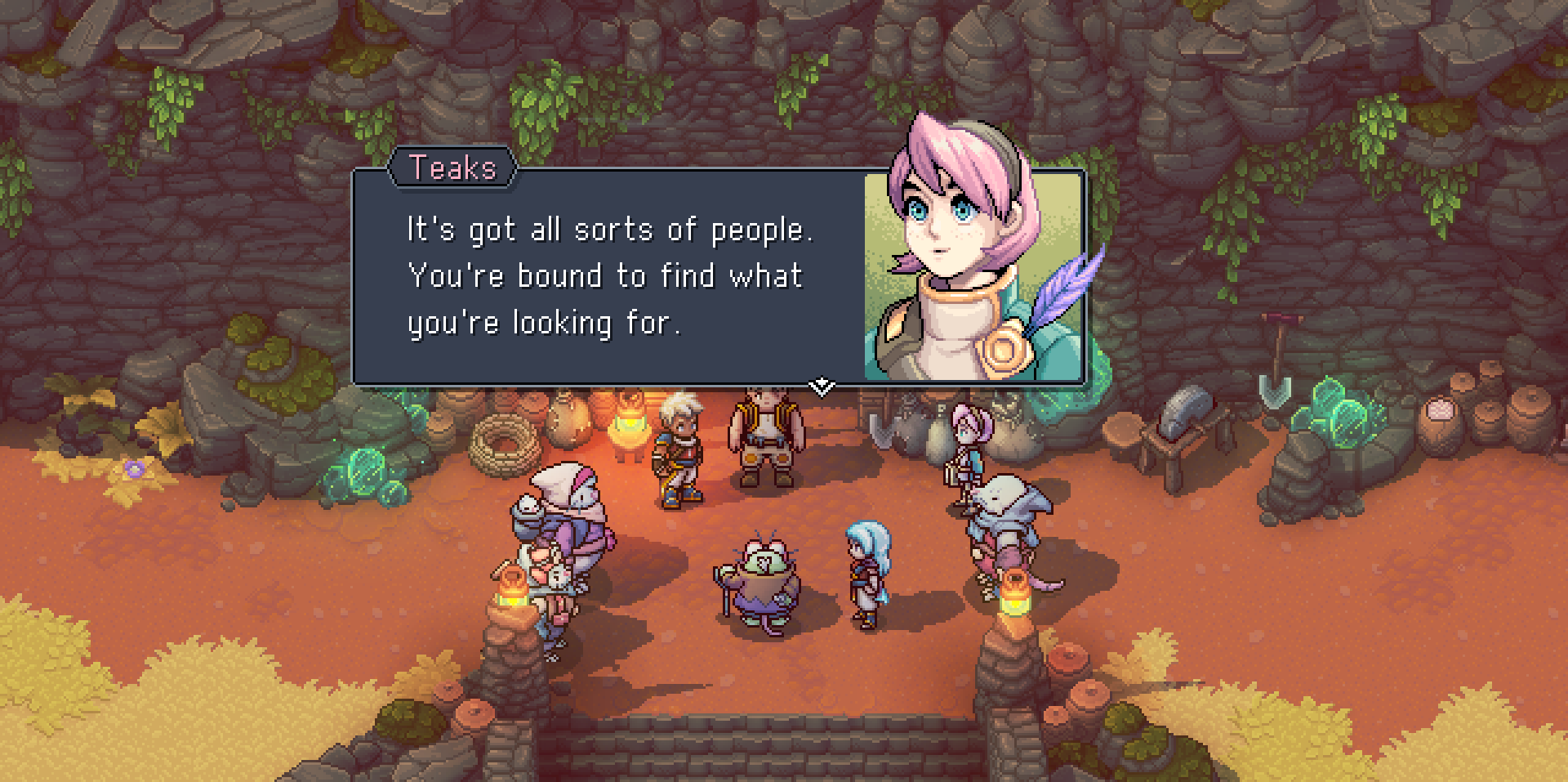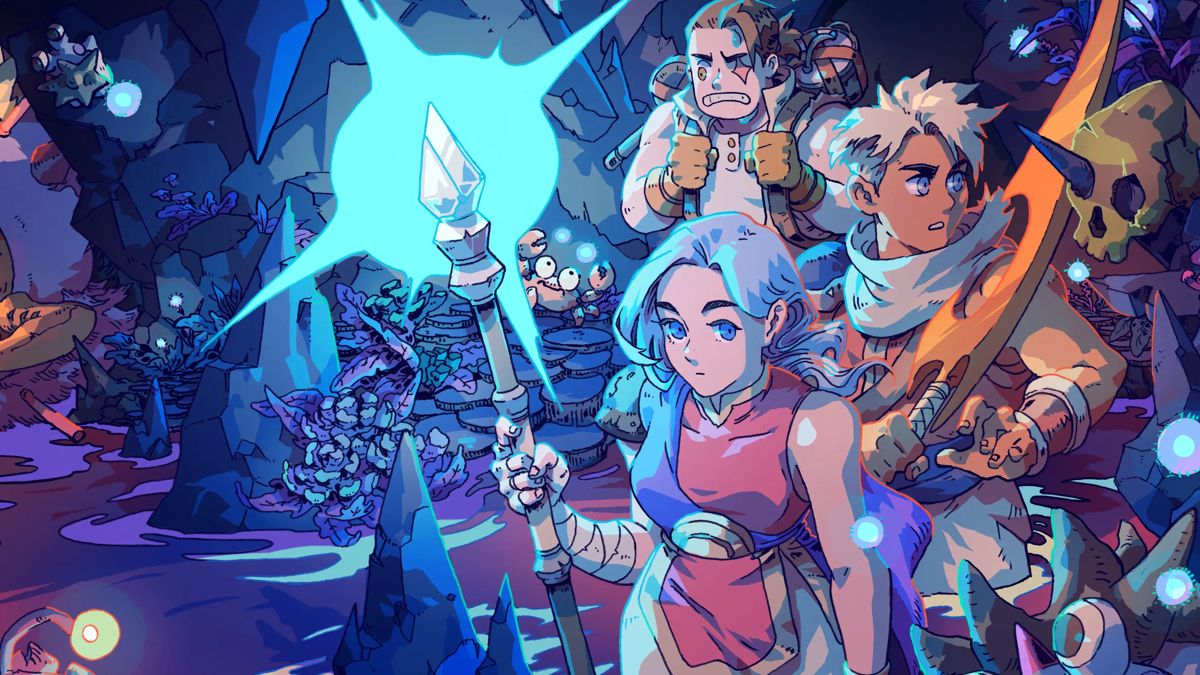Games like Chrono Trigger aged well, and Sabotage Studio knows as much. It’s evident in the open-world encounters, ambitious soundtrack, vivid environments, and even a few overarching plot ideas within Sea of Stars, the developer’s latest, classically-inspired RPG.
You can’t mention it without some combination of Japan’s RPG legacy greats coming up, and for good reason. Sea of Stars embraces the games that inspired it and the generations of roleplaying adventures that followed, creating a delightful mishmash that doesn’t fall into heavy-handed uses of do-you-remember-when moments. There’s clear adoration for the threads it’s woven together, but Sabotage Studio still crafted an experience memorable in its own right.
A touch homesick

Admittedly, I’ve long managed an awkward push-and-pull relationship with games clearly crafted from nostalgia. Plenty of my favorites fall flat when they’re no longer contextualized by the original era. Some gameplay gimmicks lost their flavor somewhere between the ‘90s and today’s conveniences, while other tributes falter when revisiting the magic of some of those stories.
Right, I’m a sourpuss when it comes to some ham-fisted throwbacks. Perhaps that comes with trying one too many games that tease an ode to an old favorite, or maybe I just didn’t love a few of those games as much as I thought. Regardless, I’ve softened in the last year or so with my adoration for Chained Echoes and now Sea of Stars.

Sea of Stars (PC[Reviewed], Nintendo Switch, PS4, PS5, Xbox One, Xbox Series X|S)
Developer: Sabotage Studio
Publisher: Nintendo
Released: August 28, 2023
MSRP: $34.99
The tale begins with Valere, a staff-wielding monk aligned with the moon, and Zale, her blade-wielding counterpart with an affinity for the sun. Destiny marks them as Solstice Warriors, and that’s where Sea of Stars begins its traditional storytelling with a battle of good versus evil.
As kids, you’ll learn there was some level of dissent over handing down the duty. The more powerful figures in their lives wished to see them grow as normal children, while the elder mage Headmaster Moraine committed to raising them both as Solstice Warriors to protect their world from a repeat tragedy. Valere and Zale embrace their training, spending years at the Zenith Academy before striking out to defeat monsters spawned by the world’s big bad, The Fleshmancer.
In the interest of sparing you from spoilers, I’ll refrain from in-the-weeds story details beyond the game’s first few hours.
To far away times

On its face, Sea of Stars comes off a little bare bones, but it weaves and twists along the way to its normal end, unlocking the way to a follow-up true ending. Even as someone with limited experience playing The Messenger, I surely missed any winks-and-nods to Sabotage’s original project; I found the journey constantly endearing. There’s nothing tiresome about its retro approach to establishing the world and its strife, but even as just a vehicle for the characters to play along in, it’s well worth the ride.
That brings me to the moment, the ah-ha! moment where everything clicks, and I’m too charmed to step away. After a series of underground mining puzzles helping a village of magical mole guys, I was already a tad fluttery. The combination of Malkomud’s over-dramatic dialogue — one of the aforementioned mole guys — and defeating his adorably dopey lizard pet escalated the pace after back-to-back tutorials. That, plus solving the underground puzzles, had me feeling a bit genius. Simple and satisfying, just enough to make me feel like I’d learned something from all that tutorial exposition.
So, I save the day as Valere, and mosy along to an outdoor elevator, and I’m greeted by The Sleeper; he’s my hook. The Sleeper is a giant dragon wrapping itself around the mountainside, and the party teased their resident chef friend, Garl, for his shock and awe upon seeing the massive serpent. I was left in the same place, so no worries, Garl. Even as someone who had no idea, no context for whatever this thing was supposed to be or do, The Sleeper had me enamored. It’s an early tease of one of Sea of Stars’ greatest strengths. When you meet The Sleeper, the game combines the beast’s magnificent rumbling, scale, and design into something special.

I didn’t know what was happening, but I wanted to do it again. And since that was the moment, I quickly went from PC to Steam Deck.
There’s something so charming about the moments of shock — the disbelief Sea of Stars’ pixelated party shows in their portraits and, sometimes, sprites. The moment-to-moment adventuring is delightful, sure, but the distinctly retro style combined with Sabotage’s vibrant, colorful environments thrills the child in me. The little girl who crept forward too close to the TV, with controller in hand and eyes as wide as they’d go.
Sabotage delivers on that bewilderment in big ways, like introducing The Sleeper, and small, like finding a hidden chest behind a waterfall or discovering off-the-beaten-path enemies. The exploration between zones often contrasts in significant ways, with big leaps between environments, music, and even some puzzle gimmicks. The game uses those modern sensibilities again with a major emphasis on verticality. It’s not enough to roam those 2D landscapes like they’re simple, open boxes. There’s paths tucked away to new treasures, and the road forward isn’t always obvious, with options to climb, jump, or swim elsewhere.
Perfect timing

On the note of beloved childhood RPGs, Sea of Stars healed an old wound left behind by Final Fantasy VIII’s battle system. While I remain an FFVIII apologist until death, and I won’t defend most of the combat design, I’ve got pretty irritating memories of trying to time Squall’s damn Gunblade trigger just right.
Sea of Stars certainly plays better in that regard, but I don’t, and it doesn’t matter. The traditional turn-based combat concepts I get, no problem. There’s flashy combo attacks, and its Lock system that roulettes its way through different damage types, indicating which you’ll need to utilize against enemies to break their cast. Those pieces clicked, but I’m absolutely terrible with the game’s trigger mechanic.
Even after dozens of hours, I’d still sit straight up for another boss encounter to watch for the perfect moment to strike. Battles require attention with their use of timed blocks and hits, that is to say, if I want that number to go up Valere’s bouncing Moonerang skill then I better watch with my bumper finger ready. And yes, it did take me a pathetic amount of time to get the achievement for 25 hits in a row, but I did it.

A faithful recipe
It’s layer after layer of the little things, with Sea of Stars. There’s nothing overly complicated about those puzzles or even the more personally challenging bits, like timing a hit just right. There’s no need to reinvent the wheel, but we can certainly spruce it up a bit. It’s a matter of taking those pieces that work but not mimicking those retro experiences wholesale because, again, some of those elements just didn’t fly.
We can compare it to just about anything of that era, and it’s not technically wrong, but it’s one that became more and more personal to my own taste with time. On more than one occasion, there were those moments of reflection with “the tone is kind of bizarre, like Earthbound” and “look, everyone is following me, remember Secret of Mana?”

As a kid growing up alongside some of those early Super Nintendo and PlayStation RPGs, Sea of Stars feels like the classics I remember; and I mean that in the purest sense. When you’re toddling about, hardly old enough to understand some of the words on the screen, nostalgia often compensates for aspects that may have grown less appealing through the years. However, if I were to dream up any old favorite from memory, I’d imagine it’d turn out something like this. Sea of Stars is endlessly charming, bright, and packing a ton of heart — another timeless addition among the classics.









